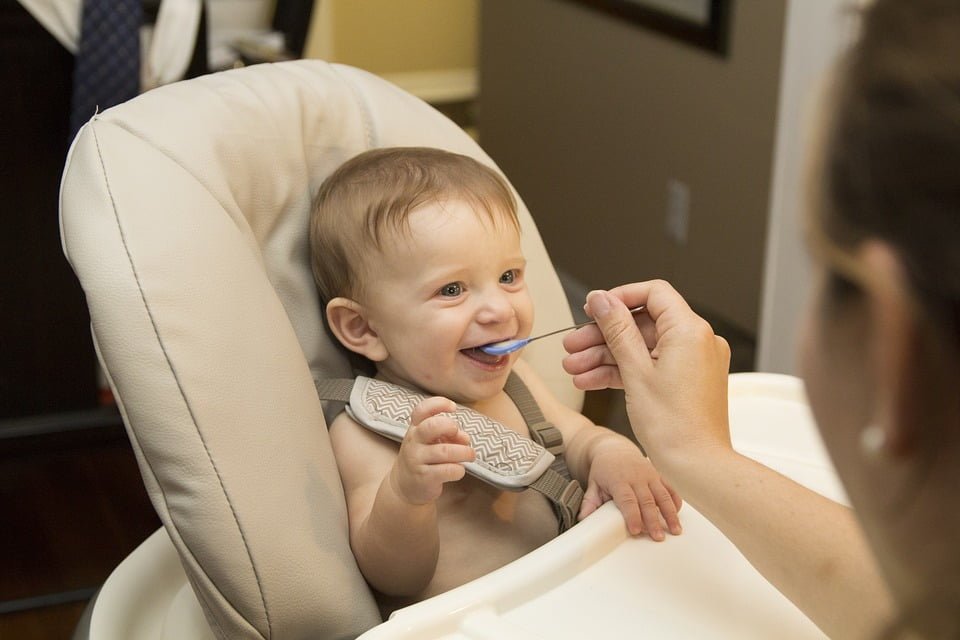Feed the baby from the first day to two years|Tips when feeding baby!
From the birth of your baby until the fourth month, the main source of nutrition is breast milk (breastfeeding) or artificial feeding sometimes, and at that age, it is enough for him. As your baby grows month by month, his food needs become varied. How do you rate him in food? When do you give him solid and liquid food? These are all questions that mothers have in mind, especially new mothers. In this article, we will inform you of the infant feeding schedule month by month, from the beginning of the fourth month until the completion of two years.
Baby Feeding Baby
-Infant nutrition from the first day until the age of four months :

The child depends entirely on breastfeeding recommended by doctors because of its many benefits to child health and development. Some mothers may also resort to artificial breastfeeding because of many factors. Keep in mind that the baby in its first four months cannot accept any food other than milk and you can not in any way introduce other ingredients to feed it.
The milk supplies your baby with all his food needs so that the water can be replaced with milk. The infant does not need to drink water during that period as long as he is regular in feeding.
Food type :
You can start feeding your child, at the age of four months, rice grains because they are less likely to cause allergies. Combine a teaspoon of cereal with several spoons of breast milk or baby milk and feed it to your baby with a soft little spoon. The baby will eat only one or two tablespoons at first but continue feeding it gradually until the mixture is thicker and feed it two to three times a day.
We recommend that you wait at least three days at a time before introducing a new sample of your baby’s food so that it is easy to determine if your child has an allergic reaction to any of the foods. Signs of allergy: diarrhea, rashes, frequent vomiting, and persistent fatigue.
Feeding the child from the age of six months until the age of eight months :
At the age of six months, your child should start eating fruits and vegetables. Many pediatricians suggest introducing vegetables first before the fruit because children have a natural preference for sweet foods and may reject the taste of vegetables.
Feed baby boiled vegetables and mashed well so that the child can swallow. The rations should gradually increase from a few teaspoons to about two tablespoons twice a day. Juices can be served to the child at this age, but not as a substitute for fruits for lack of fiber and other nutrients. It is also recommended to avoid sweetening the juice with any sweeteners.
Feeding the child from the age of eight months to twelve months :
At the age of seven months, the child is able to eat foods with slightly thick textures such as slices of soft bread and pasta cooked well and cutting soft fruits and vegetables chopped cooked. But, be careful! Many foods such as nuts, raisins, and grapes expose children under the age of five to the risk of suffocation.
During the eighth month, breast milk or formula milk should be a large part of your child’s diet with additional sources of protein and iron such as meat. Try mixing a little meat with vegetables and feet for your baby.
As your child approaches his first year, he has a wide choice of foods such as mashed potatoes, chopped meat, chicken and fish. In addition, at this stage, he can drink breast milk or whole milk.
Child nutrition from one to two years :

At this point in the life of the child begins to change the nature of food as the nature of food is approaching the adults, and here comes the role of the mother in an attempt to provide different textures and flavors of the food to get used to it.
Because the children’s stomachs are small, the mother should try to provide small meals, but they are rich in nutrients that help them to grow healthy and strong and to avoid sweets that give them calories without any nutrients from important vitamins and minerals.
We recommend dividing your child’s meals during the day into three main meals with 2 to 3 snacks.
The child begins to learn to eat himself, beginning with the fingers and then start using tableware such as the spoon at the age of 15-18 months, and the mother gives him the opportunity to develop his skills, where the child also likes to show independence and self-reliance Do not try to prevent him from this feeling and leave the time of eating do whatever he wants.
Tips when feeding baby :
-Boil water and cool it before giving it to the child, where it is best to avoid giving the child the normal water to drink.
-Stay away from adding flavorings, salt, sugar, or oil to baby food.
-Start by giving the child soft, soft, chewable foods when he or she is seven or nine months old.
-Be sure to mix new foods with milk to become easier to take.
-Avoid giving baby pizza, and meat pies being rich in fats, sugars, and salt.
-Start by giving the child one type of food, gradually recognizing the level of acceptance of the child.
















Add Comment